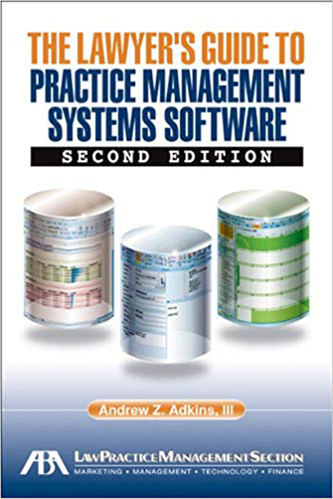ANDY ADKINS
The Lawyer's Guide to Practice Management Systems Software

Published by: American Bar Association
Release date: November 2009
Format: Paperback
ISBN13: 9781604424669
Pages: 376
Buy the Book: Amazon
OVERVIEW
What can practice management systems software do for a law practice? With the right system in place, law firms and staff will have the ability to automatically route items, tasks, documents, and events to certain people based on their role in the case or matter, as well as manage deadlines, improve responsiveness to clients, reduce malpractice insurance rates, and boost overall productivity. The challenge is to find a program that best serves the needs of the firm.
TABLE OF CONTENTS
- PREFACE AND ACKNOWLEDGEMENTS
- SECTION I: DEFINING CASE MANAGEMENT
- Databases Defined
- Features in a Case Management System
- Corporate Law Departments
- Municipalities and Government Agencies
- More Than Software
- SECTION II: CASE MANAGEMENT SYSTEMS
- Case Management System Developers
- The Case Management System Questionnaire
- How to Use the Comparison Charts
- Besides the Software
- CMS Comparison Tables
- CMS Developer Survey
- SECTION III: IMMPLEMENTING A CASE MANAGEMENT SYSTEM IN YOUR ORGANIZATION
- Needs Analysis and Requirements
- A Word About Vendors
- CMS Software Selection Overview
- Preparing the Request for Proposal
- Evaluating the Proposal
- Planning the CMS Implementation
- Integrating the CMS with Your Existing Technology
- Customizing or Configuring the CMS
- Converting and Migrating Data
- Training the Staff
- Maintenance and Support
- The Transition
- The Paradigm Shift
- When Things Go Wrong
- Summary
- Adkins' Top 10 Tips for Successfully Implementing Case Management Systems
- APPENDIX